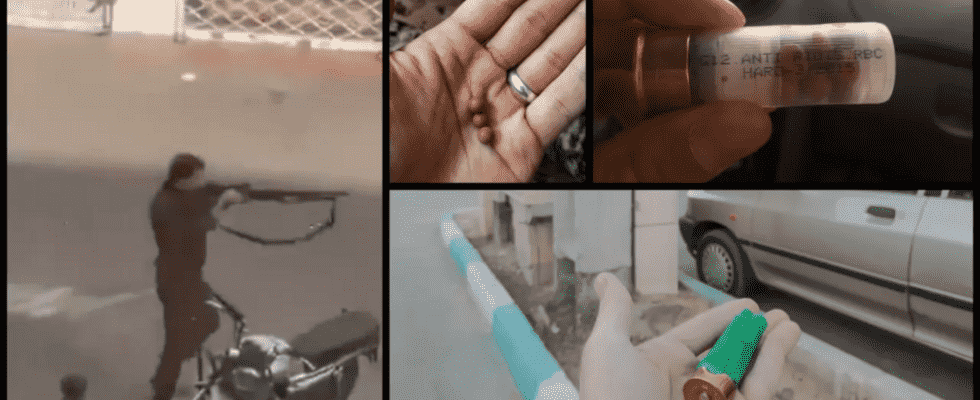Since September 16, the repression of demonstrations has killed nearly 450 people, according to the NGO Iran Human Rights. Ersahd Alijani is a journalist for Les Observateurs de France 24 and the Persian editorial staff of RFI. He conducted a lengthy investigation into the use of shotguns against protesters. Back to the main revelations of his work.
RFI: What was the starting point of this investigation?
Ershad Alijani : In fact, it all started with a photo that we received from an Iranian Internet user. It showed an empty cartridge that he said he found after a demonstration. I wanted to understand where this casing came from, by whom it was made. I found that it had been produced by a Franco-Italian manufacturer, the Cheddite company. I then wanted to know if the use of this type of cartridge was accidental or habitual in the repression of demonstrations in Iran. So I launched a call on social networks asking the Iranians to send us all the types of cartridges they found in the demonstrations. In the end, we were able to verify about 114 photos taken in thirty demonstrations in Iran. We received pictures of tear gas canisters, empty shotgun shells and paintball projectiles that Iranian law enforcement also used against protesters.
Finally, you published your investigation in several parts, the first concerns the use of “non-lethal” projectiles to kill protesters.
Yes, particularly on the use of shotguns. We managed to talk to a member of the Basij, the paramilitary force of the Revolutionary Guards. He explained to us that they use a lot of shotguns for repression of demonstrations with cartridges generally intended for hunting. He affirms that there is a lack of training for the use of this type of weapon but above all that the members of the Basij have carte blanche to kill. There is no supervision or prosecution in case of abuse. According to him, his comrades shoot at the upper part of the demonstrators’ bodies, the face, the chest, etc. Shots that can easily be lethal. According Amnesty International at least 20 people died directly from pellets in shotgun shells. Thousands of people were injured. Some have lost their sight. We also received unpublishable photos of legs, arms half torn off due to near-point-blank shots.
►Also listen: Iran: the regime “worries about the confusion that reigns within it”
For two months we have been talking about a less violent repression than that of the 2019 demonstrations on which you have also investigated. According to your recent publications, it is above all a different type of violence.
First of all, we must not forget that we do not know exactly how many people died, neither in 2019, nor now in 2022. There are indeed perhaps fewer deaths since the estimates are 1,500 deaths in two weeks three years ago and 400 deaths in three months now. But on the other hand, today there are thousands of injured, seriously injured. I believe Iranian law enforcement learned lessons from 2019. They replaced Kalashnikovs with shotguns. It may kill less but it hurts more people. The violence is still there.
The other main part of this investigation concerns theuse by government forces of cartridges from the Franco-Italian company Cheddite in suppressing protests. However, the European Union has banned since 2011 the export to Iran of equipment that can be used in the repression of demonstrations. How did these cartridges arrive in Iran?
We don’t know exactly how, but we have some clues that allowed us to get an idea. Italian colleagues conducted another investigation into the use of company cartridges Burma cheddite, also subject to restrictions. They found that it had first sold its cartridges to a Turkish company and the latter then sold them to Burma. But the important point is that Cheddite was a shareholder of this same Turkish company at the time.
We therefore looked for possible links between Cheddite, Turkey and Iran. In public UN data, we notably found that between 2011 and 2020, Turkey sold the equivalent of 7 million euros worth of shotgun cartridges to Iran despite all UN bans, of the European Union and the United States. In addition, on the forums of Iranian hunters, we found photos and discussions concerning Cheddite casings from Turkey. These casings had the same marking as those used in Burma.
►Also read: Iran: communication war on the lessons of the first day of strike
Is there any other important point to raise from this survey?
A certain disappointment, perhaps? I believe this is an important subject that affects Iranians, literally. At the same time in Europe, in France and Italy in particular, politicians claim to want to support the demonstrators. In this specific case they could do something concrete: question this Franco-Italian manufacturer, Cheddite, to understand why its casings are currently injuring people in Iran. Especially since another article was added in 2012 to the European legislation on 2011, directly mentioning a ban on the sale of shotgun casings as they were already being used in the suppression of protests in Iran. The French and Italian governments are legally responsible for enforcing sanctions against Iran. These European regulations exist precisely in order to avoid the current scenario. Unfortunately, since the publication of our articlewe saw no action.
